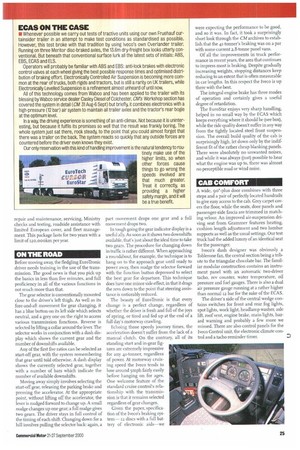ECAS ON THE CASE
Page 27

If you've noticed an error in this article please click here to report it so we can fix it.
• Whenever possible we carry out tests of tractive units using our own Fruehauf curtainsider trailer in an attempt to make test conditions as standardised as possible. However, this test broke with that tradition by using Iveco's own Over'ander trailer. Running on three Mentor disc-braked axles, the 13.6m dry-freight box looks utterly conventional. But beneath that conventional surface lurk all the latest sets of initials: ABS, EBS, ECAS and ELS.
Operators will probably be familiar with ABS and EBS: anti-lock brakes with electronic control valves at each wheel giving the best possible response times and optimised distribution of braking effort. Electronically Controlled Air Suspension is becoming more common at the rear of trucks, both rigids and tractors, but is still a rarity on UK trailers, while Electronically Levelled Suspension is a refinement almost unheard of until now.
All of this technology comes from Wabco and has been applied to the trailer with its blessing by Wabco service dealer Casley Diesel of Colchester. CM'S Workshop section has covered the system in detail (CM 31 Aug-6 Sept) but briefly, it combines electronics with a high-pressure (12 bar) air system to maintain all trailer axles and the tractor's rear bogie at the optimum level.
In a way, the driving experience is something of an anti-climax. Not because it is uninteresting, but because it fulfils its promises so well that the result was frankly boring. The whole system just sat there, rock steady, to the point that you could almost forget that there was a trailer on the back. The system reacts so quickly that any outside forces are countered before the driver even knows they exist.
Our only reservation with this kind of handling improvement is the natural tendency to routinely make use of the higher limits, so when other forces cause things to go wrong the speeds involved are that much greater. Treat it correctly, as providing a higher safety margin, and it will be a true benefit.












































































































